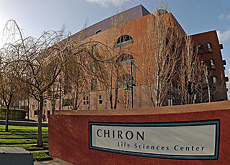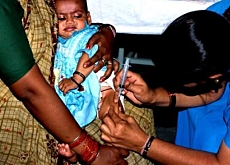Novartis banks on vaccines for future growth

Swiss drugs giant Novartis could invest up to $600 million in a US-based facility to develop a new generation of vaccines based on cell culture techniques.
The company is banking on taking advantage of a revived vaccines market that has trebled in value in the past 20 years, according to experts.
Technological advances coupled with ever-increasing demand will continue to boost the once neglected sector, which was worth at least $6 billion (SFr7.55 billion) in 2005.
Novartis clinched a $220 million contract from the US government in May to develop a flu vaccine, a month after completing the takeover of the world’s fifth largest vaccine maker US-based Chiron.
The market for flu vaccines alone is expected to treble to $3 billion in the next four years. But the threat of a bird flu pandemic is not what is actually driving the recent resurgence in the market, according to Karl Heinz Koch of Lombard Odier Darier Hentsch.
“The search for a bird flu vaccine may have been in the news a lot recently, but in reality the potential for normal seasonal demand would not be as great as for other vaccines,” he told swissinfo.
“The real catalyst for a bigger interest in vaccines was the launch of Prevnar against pneumococcal [lung] infections [in 2000]. This vaccine became a multi-billion dollar product within a year or two because of the huge demand.
“Work has been in progress for a number of years on a completely new breed of vaccines coming through the pipelines of various companies.”
Biotech breakthroughs
Scientific breakthroughs using advanced biotechnological processes have recently allowed pharmaceuticals to produce greater quantities of vaccines at a lower cost.
The sector was made even more valuable after several companies dropped out, allowing the remaining firms to steal a lead and corner the market, according to Koch.
“The buyout of Chiron was very opportune moment for Novartis to get exposure to this sector as there are now significant entry barriers to complete newcomers,” Koch said.
“They identified this area after ruthlessly looking at every market and figuring out that vaccines were the place to be.”
Worldwide vaccine sales have risen from around $2 billion in 1980 to about $6bn. But some industry insiders put the 2005 figure to nearer $8 billion.
Novartis is dwarfed by vaccine industry leaders GlaxoSmithKline, Merck, Wyeth and Sanofi-Aventis, but Koch believes daughter company Chiron is well placed to catch up some of the ground.
Chiron researchers are at the forefront of new technology to produce a new generation of vaccines produced in animal cells rather than the current and less efficient method of using chicken eggs.
“Novartis is a small player when benchmarked against the bigger established companies, but Chiron has the advantage of having wide enough range of products and being at forefront of new technologies,” Koch said.
swissinfo, Matthew Allen
Novartis has not ventured into vaccine production before, but now plans to launch a fourth division, vaccines, now that its takeover of California-based Chiron has been approved.
It will invest initially around $267 million in the North Carolina facility and employ 350 people.
Novartis was formed in 1996 through the merger of Ciba-Geigy and Sandoz.
Last year healthcare market researchers IMS Health rated Novartis as the fourth largest drugs firm in the world in terms of total pharmaceutical sales (SFr27.08 billion) and estimated the Basel-based giant had a 5.05% share of the total market.
Novartis turned in a record profit of SFr7.8 billion ($6.1 billion) with net sales of SFr41.7 billion in 2005.
The new Novartis plant in North Carolina plant will be the first in the US to produce vaccines using cell cultures.
The technique should speed up vaccine development significantly since existing vaccines are derived from eggs and can take up to nine months to produce.
The plant would have an annual capacity of 50 million doses of flu vaccine normally and could produce as many as 150 million doses in a pandemic.

In compliance with the JTI standards
More: SWI swissinfo.ch certified by the Journalism Trust Initiative












You can find an overview of ongoing debates with our journalists here . Please join us!
If you want to start a conversation about a topic raised in this article or want to report factual errors, email us at english@swissinfo.ch.